Ever wonder why singers always seem to have a steaming cup nearby?
That’s no ordinary drink—it’s their secret weapon for keeping their voice in top shape. And you don’t need to be the next superstar to benefit from this vocal hack.
Your voice is Lovely. It helps you talk, sing, cheer, and express yourself every day. But just like any tool that gets used a lot, it needs some care.
That’s where tea comes in. The right cup can soothe a scratchy throat, calm irritated vocal cords, and help you sound your best. No fancy medicine or expensive treatments needed—just natural ingredients that have helped throat health for centuries.
If you teach all day, love to sing, or just talk a lot, the perfect tea can make a huge difference in how your voice feels and sounds.
Let’s check out the best options for keeping your vocal cords happy!
What Makes a Tea Good for the Vocal Cords?
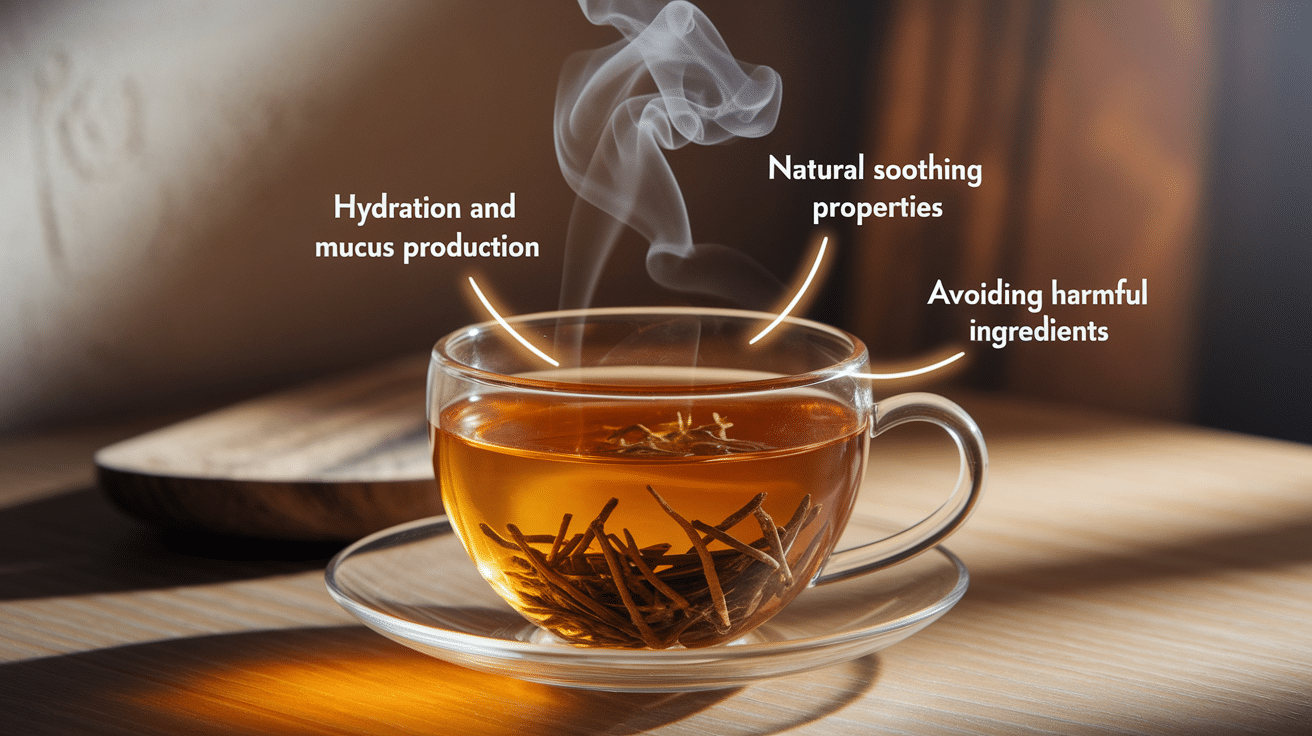
The right tea soothes, hydrates, and protects your vocal cords—without irritating or drying out your throat.
1. Natural Soothing Properties
The best teas for vocal health contain compounds that directly benefit your throat and vocal cords. These include:
- Antioxidants: Help fight free radicals and reduce cellular damage from vocal stress
- Anti-inflammatory compounds: Reduce swelling and irritation in the vocal folds
- Mucilage: Plant compounds that create a protective, gel-like coating over irritated tissues
2. Hydration and Mucus Production
One of the simplest yet most overlooked aspects of vocal health is proper hydration. Your vocal cords need moisture to function optimally—dry vocal folds can lead to strain and injury.
Warm tea provides dual benefits: the liquid itself hydrates your system, while the steam you inhale while drinking helps to maintain moisture directly in the throat area. Proper hydration also helps keep the right consistency of mucus, which protects and lubricates your vocal apparatus.
3. Avoiding Harmful Ingredients
Just as important as knowing what to drink is understanding what to avoid. Certain beverages can actually harm your vocal performance:
- Caffeine: Found in black tea, green tea, and some herbal blends, caffeine can dehydrate the vocal cords
- Alcohol: Even when found in medicinal tinctures, alcohol dries out the throat
- Artificial flavorings: Can trigger irritation or allergic responses in sensitive individuals
- Extremely hot liquids: Can cause inflammation and damage delicate tissues
Best Herbal Teas for Vocal Cord Health
These herbal teas offer natural relief, healing, and support for anyone who uses their voice regularly or professionally.
1. Licorice Root Tea
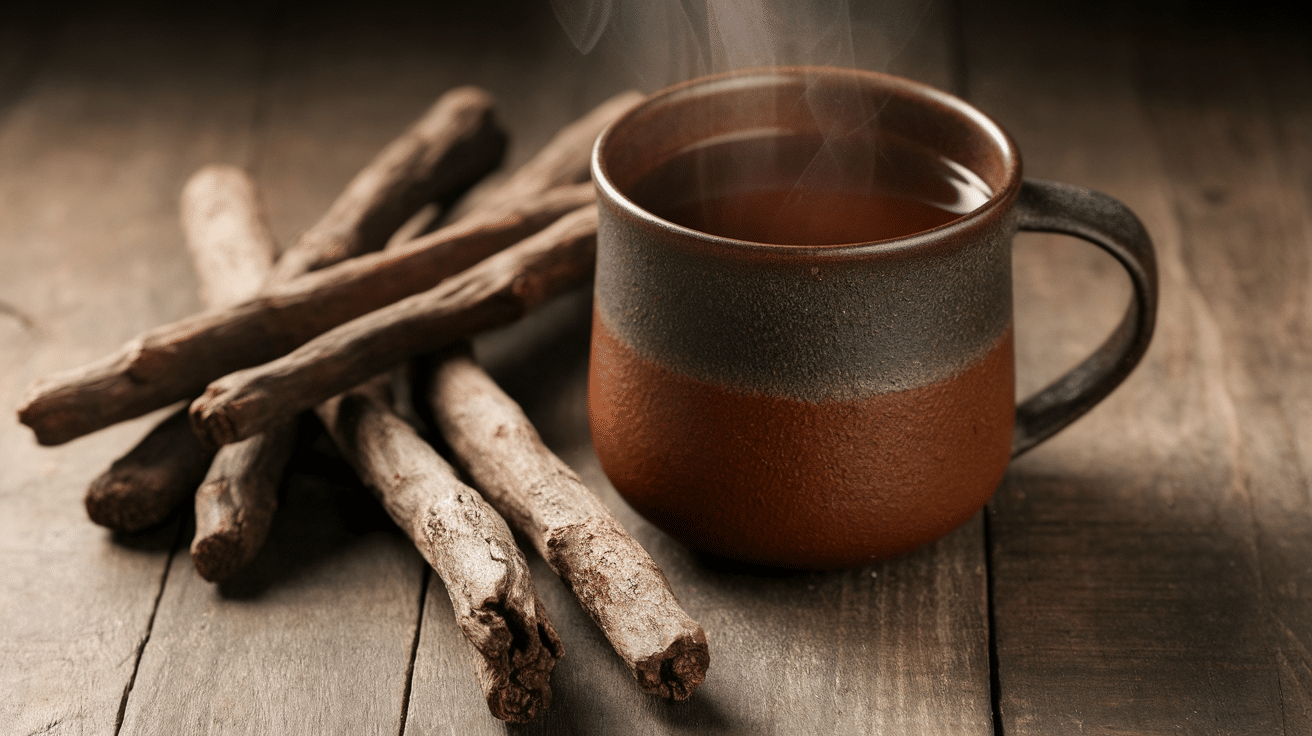
Licorice root has been used for centuries in traditional medicine for its remarkable soothing properties. It contains glycyrrhizin, a compound with powerful anti-inflammatory effects.
Benefits:
- Coats irritated throat tissues
- Reduces inflammation in the larynx
- Soothes coughs and throat irritation
- May help heal minor vocal cord injuries
Best for: Recovery from intense vocal performances or when experiencing throat discomfort.
2. Ginger Tea
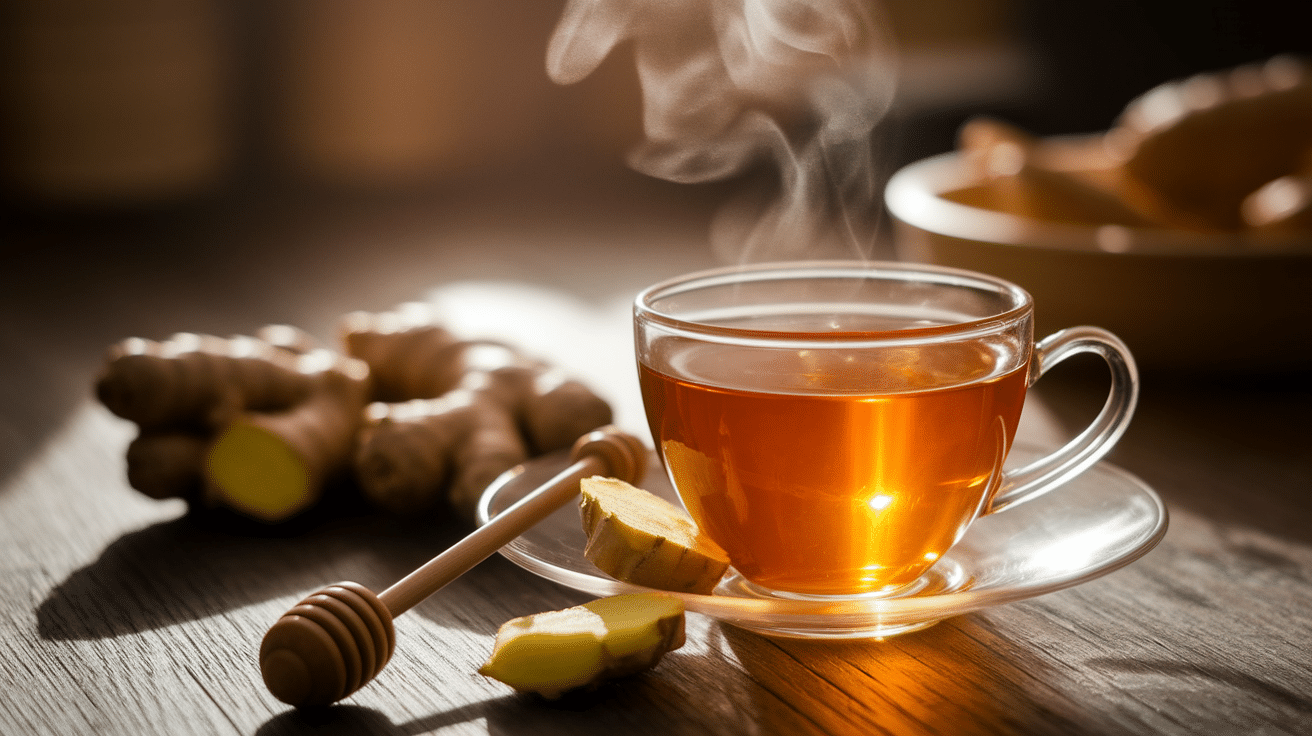
This spicy, warming tea does more than just taste good—it’s a powerhouse for throat health.
Benefits:
- Reduces inflammation throughout the body, including the throat
- Supports immune function to fight off infections that affect the voice
- Increases circulation, which can speed healing
- Thins mucus that might otherwise clog the throat
Best for: The early stages of throat discomfort or when you feel your voice becoming strained.
3. Slippery Elm Tea

Derived from the inner bark of the slippery elm tree, this tea creates a remarkable protective coating in the throat.
Benefits:
- Rich in mucilage that forms a gel-like barrier over irritated tissues
- Provides long-lasting relief from soreness
- Reduces the urge to clear your throat (which can cause further irritation)
- Traditionally used by opera singers before performances
Best for: Pre-performance preparation and soothing already irritated vocal cords.
4. Chamomile Tea
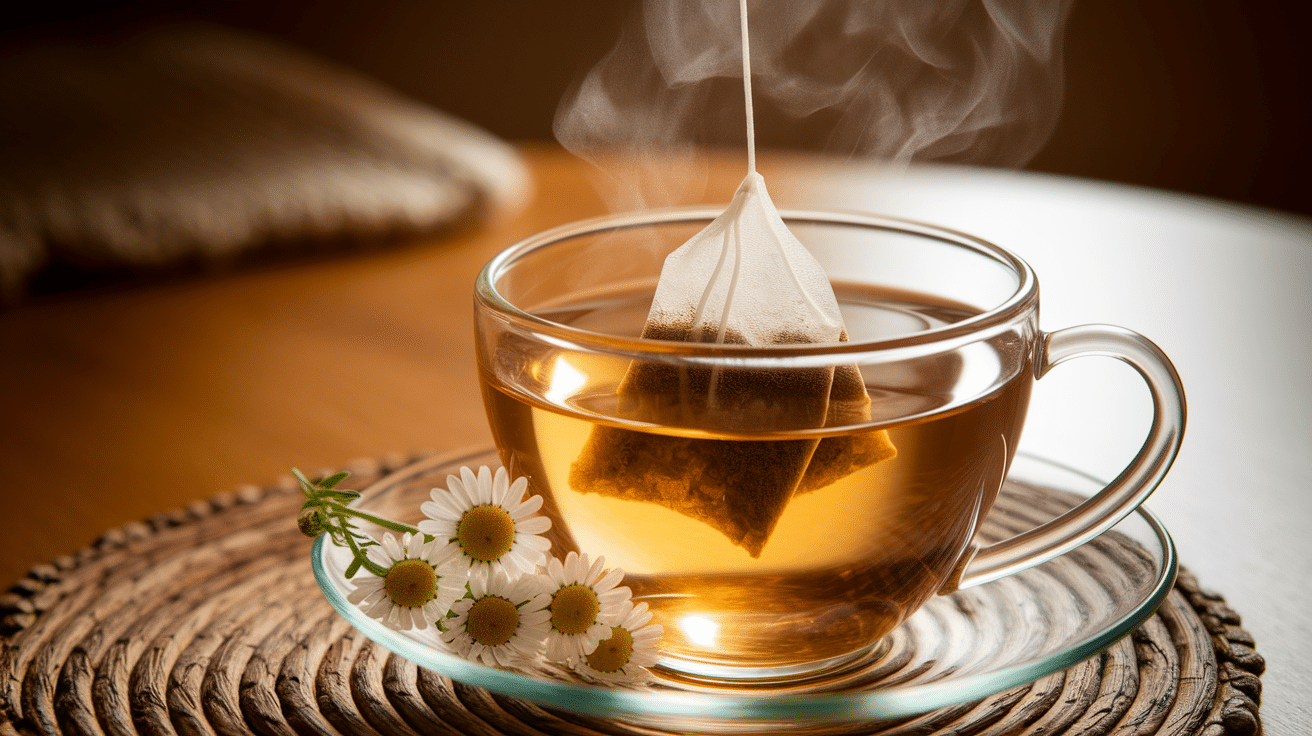
This gentle, floral tea does more than just promote relaxation—it actively supports vocal health.
Benefits:
- Anti-inflammatory properties help reduce swelling in the vocal folds
- Relaxing properties can reduce tension in the throat muscles
- Mild analgesic (pain-relieving) effect
- May help reduce acid reflux, which can damage vocal cords
Best for: Evening vocal recovery and relaxing tension in the throat after a day of heavy voice use.
5. Marshmallow Root Tea

Despite its name, this has nothing to do with the sweet treat. Marshmallow root (Althaea officinalis) produces one of the most effective throat-coating teas available.
Benefits:
- Exceptionally high in mucilage that creates a protective film over the throat
- Soothes irritation almost immediately upon contact
- Helps maintain appropriate moisture levels in the throat
- Can reduce the pain of speaking when vocal cords are inflamed
Best for: Immediate relief when experiencing vocal fatigue or soreness.
6. Peppermint Tea
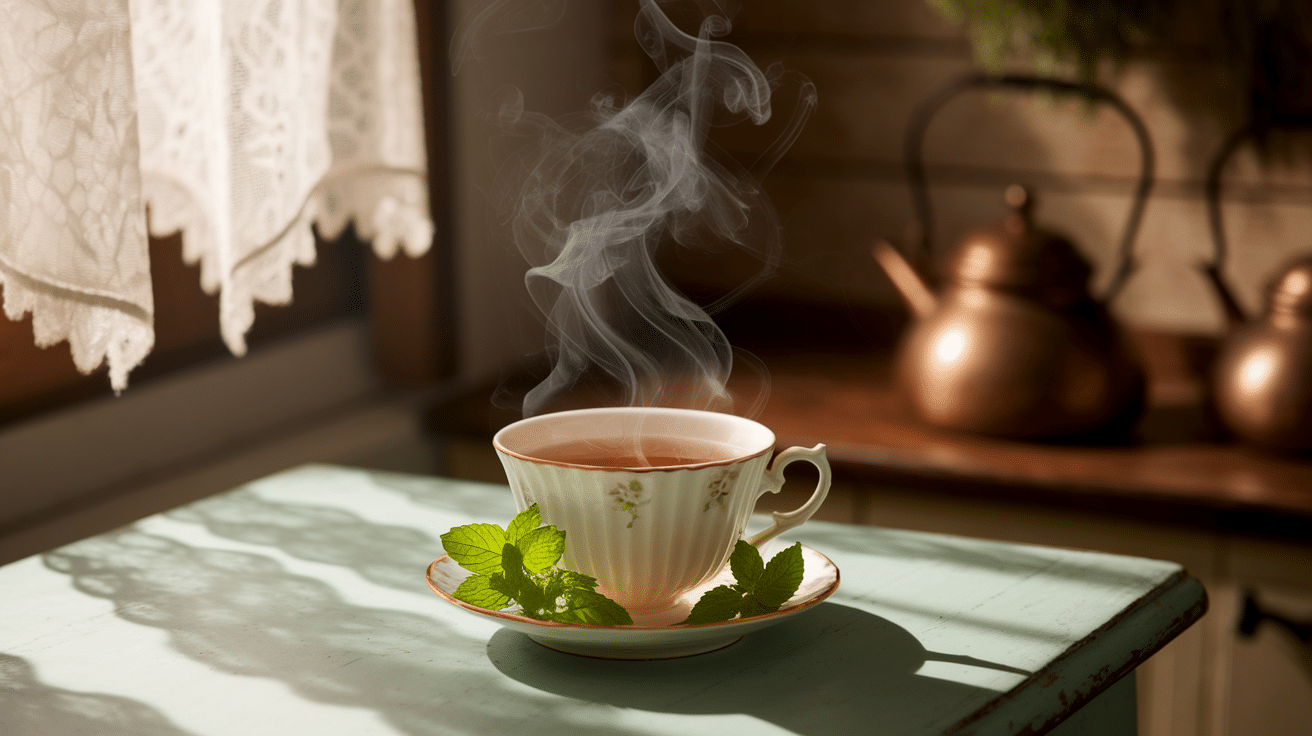
The cooling sensation of peppermint tea isn’t just refreshing—it’s therapeutic for your vocal mechanism.
Benefits:
- Natural menthol provides a cooling sensation that relieves pain
- Anti-inflammatory properties reduce swelling
- Can help clear congestion that puts pressure on the vocal cords
- Relieves tension in the throat and neck muscles
Best for: Clearing congestion and providing immediate cooling relief to an overworked throat.
7. Turmeric Tea
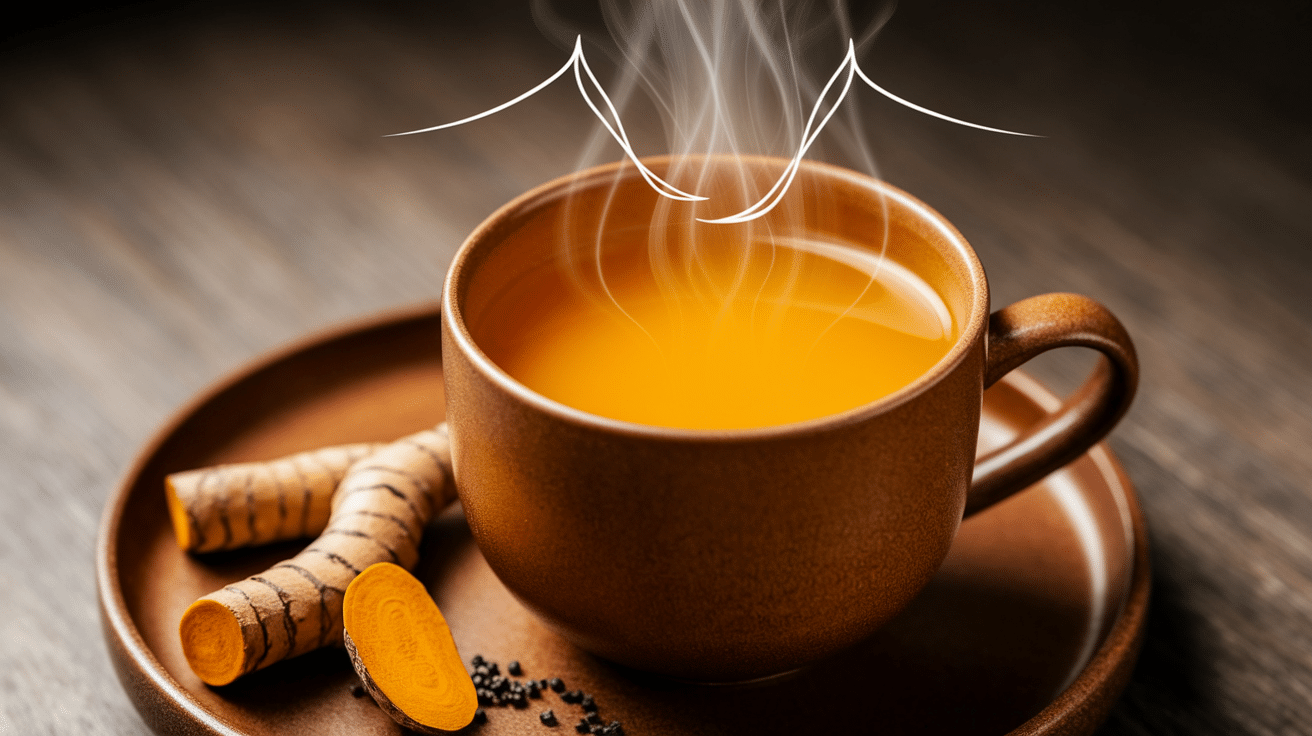
Often called “golden milk” when prepared with warm milk alternatives, turmeric tea harnesses the power of curcumin for vocal health.
Benefits:
- Powerful anti-inflammatory effects throughout the body
- May speed healing of minor vocal cord injuries
- Boosts immune function
- Can reduce pain associated with throat irritation
Best for: Long-term vocal health support and recovery from chronic vocal strain.
8. Throat Coat Tea (Blends)
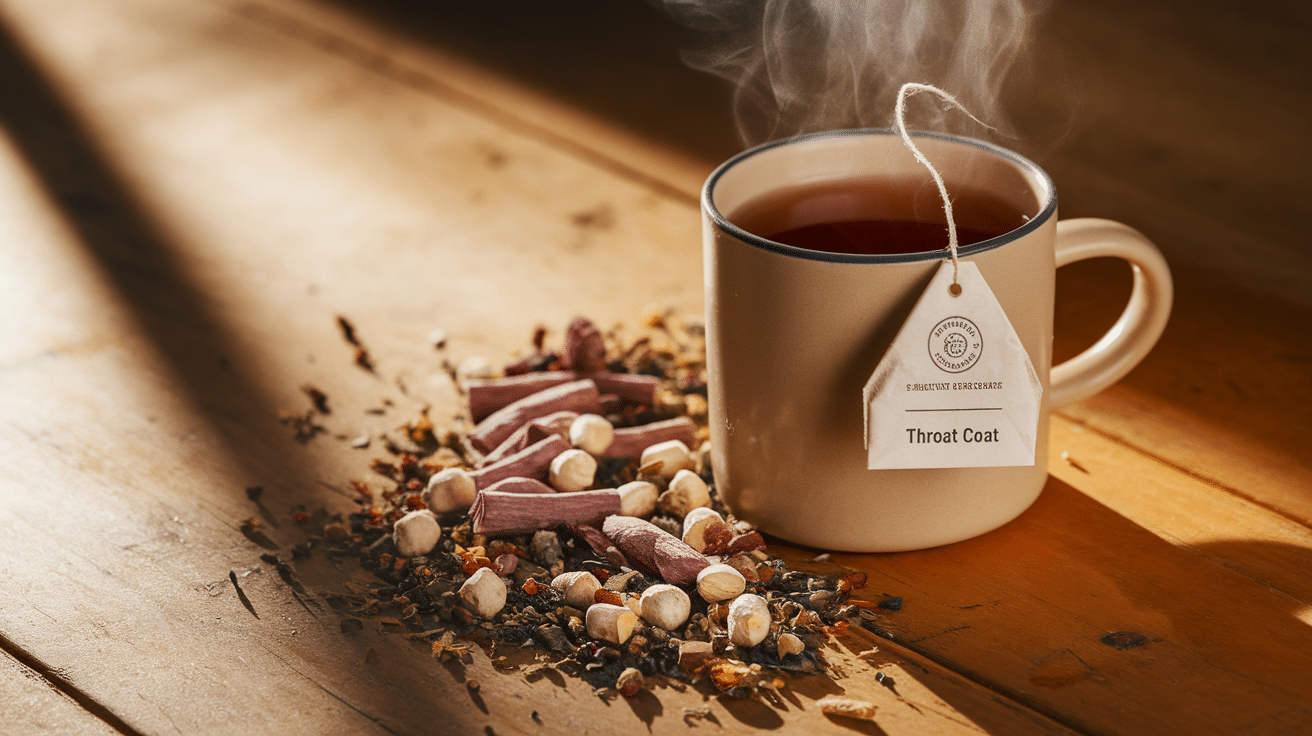
Several companies now produce specialized blends designed specifically for vocal professionals. These typically contain a mixture of the herbs mentioned above.
Benefits:
- Combines multiple beneficial herbs in balanced proportions
- Formulated specifically for vocal needs
- Often includes licorice, slippery elm, and marshmallow root
- Convenient for regular use
Best for: Daily maintenance and professional voice users who want a comprehensive solution.
When to Drink Tea for Vocal Health
Timing matters—learn when to drink tea for the most effective vocal care, recovery, and daily prevention.
1. Before Performing or Speaking
Preparing your vocal cords before intensive use can significantly reduce strain and improve performance:
- Drink a throat-coating tea like slippery elm or marshmallow root 30-60 minutes before performing
- Opt for lukewarm (not hot) tea to avoid thermal stress on the vocal cords
- Allow the tea to make contact with all parts of your throat by sipping slowly
- Pair with gentle vocal warm-ups for best results
2. After Heavy Vocal Use
Recovery is just as important as preparation:
- Choose anti-inflammatory options like turmeric or ginger immediately after heavy voice use
- Continue hydrating with gentle teas for several hours after performance
- Consider alternating between different beneficial teas for comprehensive care
- Pay attention to how your voice feels and adjust your tea selection accordingly
3. Daily Preventative Use
For long-term vocal health, consistency matters:
- Establish a routine of 2-3 cups of vocal-supporting tea throughout the day
- Rotate between different beneficial herbs to get varied compounds
- Make hydration with throat-friendly teas part of your professional practice
- Consider seasonal adjustments (more immune-supporting teas during cold and flu season)
Tips for Making Tea Even More Effective
Simple additions and smart habits can increase the vocal benefits of your tea with every soothing sip.
1. Add Raw Honey
A spoonful of raw, unpasteurized honey can transform a good vocal tea into a great one.
It provides additional coating for irritated tissues, has natural antimicrobial properties, soothes pain, reduces coughing, and can help thin mucus without increasing production.
Note: Always add honey after the tea has cooled slightly to preserve its beneficial enzymes.
2. Skip Dairy Additions
While creamy additions might taste good, they can work against your vocal health. Dairy can increase mucus thickness in many individuals, making clear articulation more difficult.
It may create a “coated” feeling that impedes vocal flexibility. Consider plant-based milk alternatives if you prefer creamy tea.
3. Drink Slowly
How you drink your tea matters almost as much as what you’re drinking.
Slow sipping allows the tea to contact all parts of the throat, gives therapeutic compounds time to do their work, maximizes the benefit of steam inhalation, and creates a moment of mindfulness about your vocal health.
Final Thoughts: Sip Smart for a Stronger Voice
Taking care of your voice doesn’t have to be complicated. These natural teas offer a simple way to protect and heal your vocal cords without breaking the bank.
Remember, the best tea routine is one you’ll actually stick with. Start by trying one or two options that sound good to you. Pay attention to how your voice responds.
Sipping tea might seem like a small thing, but those little habits add up to big results over time. Your voice is unique and deserves good care.
So next time your throat feels tired or your voice sounds scratchy, reach for a warm cup instead of pushing through the strain.
Your vocal cords will thank you—and so will everyone who gets to hear your clear, strong voice!
















